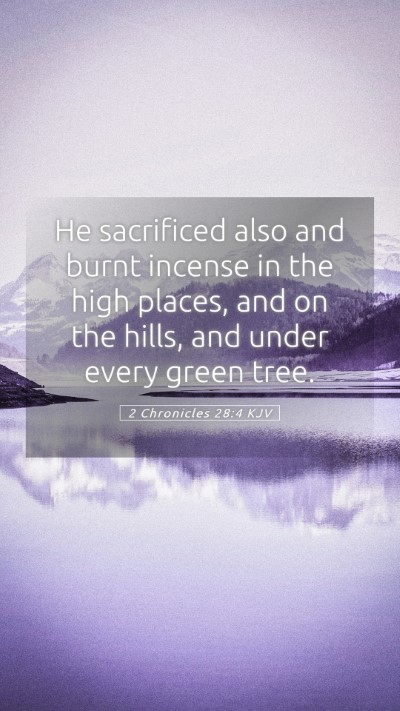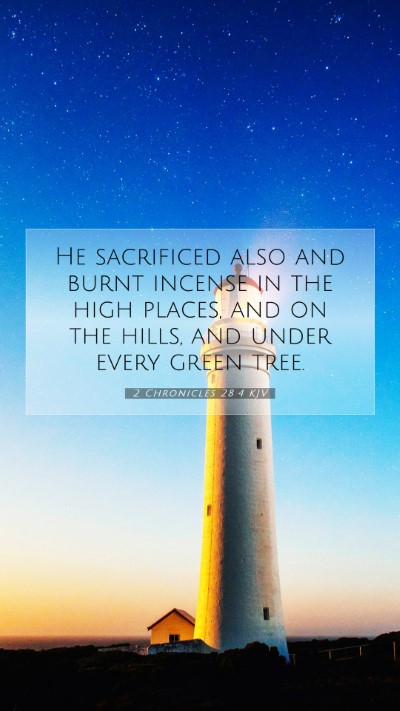Bible Verse Analysis: 2 Chronicles 28:4
Verse: "He sacrificed also and burnt incense in the high places, and on the hills, and under every green tree." (2 Chronicles 28:4)
Overview of 2 Chronicles 28:4
This verse describes the actions of Ahaz, king of Judah, who engaged in practices that were contrary to the worship of Yahweh. By burning incense in high places and under trees, Ahaz was participating in idolatrous rituals that were prevalent in the surrounding nations.
Bible Verse Meanings
This passage is significant in understanding the spiritual decline of Judah during Ahaz's reign. Commentators emphasize the following insights:
- Idolatry and Infidelity: Ahaz's actions illustrate a direct rebellion against God's commands. In many public domain commentaries, such as those by Matthew Henry and Adam Clarke, the emphasis is placed on how these practices reflected a departure from the covenant relationship that Judah had with Yahweh.
- High Places: The term "high places" often refers to sites of worship that were unauthorized by God, usually linked to Canaanite and other pagan practices. These sites were set apart for idols rather than the one true God, highlighting the conflict between faithful worship and the pull of surrounding cultures.
- Cultural Context: Commentaries note that the prevalence of such practices was not only a rejection of God but also influenced by the cultural climate of the time. Ahaz, facing geopolitical pressures, sought to align himself with pagan worship as a means of gaining favor and securing his throne.
- Destructive Influence: This verse serves as a warning regarding the destructive influence of unfaithfulness. The consequences of ignoring God's commandments were dire, leading to national calamity as detailed in other parts of the Scripture.
Interpretation and Understanding
In understanding this verse, we can apply several interpretive principles:
- Historical Context: Knowing the history of Judah's kings helps comprehend the weight of this verse. Ahaz was amidst a decline both morally and politically, wrestling with threats from Israel and Syria.
- Theological Implications: The act of burning incense represented worship, and in this context, it symbolizes how easily one can deviate from true worship and embrace false religious practices.
Application of 2 Chronicles 28:4
The actions of Ahaz can resonate powerfully with us today:
- Current Practices: Believers must be cautious of contemporary idols that distract from devotion to God. Much like it was in Ahaz's time, societal norms can lead us to compromise our faith.
- Revisiting Our Worship: This verse encourages reflection on how we worship. Is our worship aligned with God's Word, or do we allow cultural influences to dictate our approach to God?
Cross References
This verse is related to several significant passages that further illustrate the themes of idolatry and divine worship:
- 1 Kings 12:31: Elaborates on the establishment of high places in Israel.
- 2 Kings 16:3: Outlines Ahaz's idolatrous practices in detail.
- Jeremiah 2:13: Highlights the abandonment of the "fountain of living waters."
Conclusion
2 Chronicles 28:4 serves as a potent reminder of the dangers of straying from true worship and the consequences of idolatry. Through the lens of historical context and theological implications, we gain a deeper understanding of Scripture, allowing us to apply its lessons to our lives today.
This analysis demonstrates the importance of biblical exegesis and the richness found in public domain commentaries, crucial for anyone seeking Bible verse meanings, Bible verse interpretations, and a deeper understanding of Scripture.


